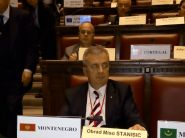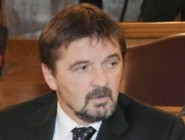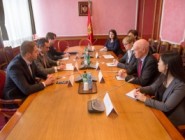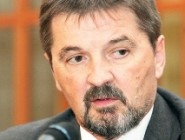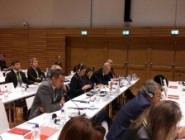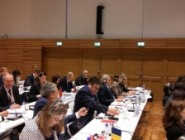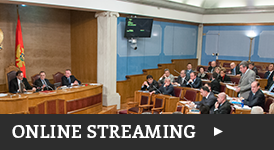Izložba povodom Dana parlamentarizma
Povodom 31. oktobra, Dana parlamentarizma, u Galeriji „Art“ u Podgorici, u poneđeljak u 11 sati, biće otvorena izložba radova iz umjetničke kolekcije Skupštine Crne Gore.…
Sittings of the Seventh, Eleventh and Twelfth Extraordinary Session of the Parliament of Montenegro in 2016 end
Governor of the Central Bank of Montenegro appointed
Latest News
- Activities of Working Bodies
- Meetings of Working Bodies
- Details
- Category: O nama
The competencies of the Parliment shall be established by the Constitution of the Republic and by certain legislation. In accordance with those competencies, the Parliament:
1) adopts: the Constitution and the amendments to the Constitution; laws, other regulations and general acts (declarations, resolutions, decisions, recommendations and conclusions); the budget and the annual financial statement for every year; Spatial plan of the Republic and other spacial plans for the areas of special purpose of interest to the Republic;
2) decides: on starting the procedure for determining whether the President of the Republic violated the Constitution; on the dismissal of the President of the Republic, if the Constitutional Court determines that he violated the Constitution; on the confidence to the Government; on the debits of the Republic and lending; on the calling for a republic referendum;
3) gives: authentic interpretation of laws it adopts; amnesty to persons convicted of crimes;
4) ratifies: international treaties; appointment of members of the Council of Radio and Television of Montenegro and the Council of the Agency for Broadcasting;
5) elects, appoints and dismisses from duty: the Prime Minister and the members of the Government; the President and the judges of the Constitutional Court; the President and the judges of the courts in the Republic; the State Prosecutor and its deputies; the Protector of Human Rights and Liberties (Ombudsman) and its deputies; the members of the Judicial and Prosecutorial Council; the president and members of the Council of the Central Bank of Montenegro; the president and members of the Senate of the State Audit Institution; the president and members of the Commission for Securities; the president and members of the Comission for Establishing Conflict of Interests; members of the Regulatory Agency for Energy Committee; the president and members of the Republic Electoral Commission; the president and members of the jury for the state awards, etc.;
6) examines the work reports and other reports of: the Central Bank of Montenegro; the State Prosecutor; the Protector of Human Rights and Liberties (Ombudsman); the Commission for Securities; the Comission for Establishing Conflict of Interests; the Regulatory Agency for Energy, etc.
- Details
- Category: O nama

The Parliament is the organ of the legislative power in the Republic. It is the representative body of the citizens, and it is consisted of MPs that are elected by citizens in direct and secret ballot on the basis of a general and equitable voting right.
Term of office of the Parliament shall last four years, an MP does not have binding mandate, they shall decide and vote according to their own beliefs, they shall enjoy immunity and may not be recalled.An MP shall be elected for every six thousand voters, in the Republic as a unique electorate, on the basis of electoral lists submitted by: political parties (party electoral list), coalitions of political parties (coalition electoral list) and the groups of citizens (electoral list of the group of citizens). Mandate of MPs shall be allocated according to the proportionate, Doont’s electoral principle, i.e. the principle of the largest quotient.
The Parliament shall work in regular and extraordinary sittings. The regular sittings shall be convened twice a year, namely: the first regular session shall start on the first working day in March and shall last until the end of July, and the second one shall start on the first working day in October and shall last until the end of December. The extraordinary session shall be convened at the request of not less than one third of the total number of MPs, or at the request of the President of the Republic and of the Prime Minister, and they shall be convened in the period from the first working day in January until the last working day in February, as well as from the first working day in August until the last working day in September.




